PEP小学六年级英语总复习资料.doc
人教PEP小学六年级上册英语一至三单元总复习
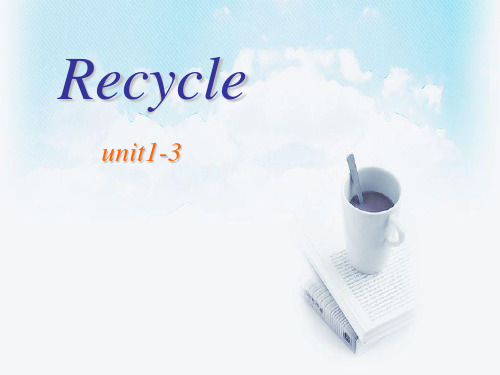
八、读一读,判断正误(10分) There are four people in Mr Black’s family . They’re Mr Black , Mrs. Black , their daughter Amy and their son Sam . Amy has got a bike ,she goes to school by bike . Sam hasn’t got a bike , he goes to school by bus . Mr Black goes to work by car . Mrs. Black is a teacher , and the home is near the school . She goes to work on foot . ( F ) 1. There are five people in the family . ( T ) 2. Amy goes to school by bike . ( F ) 3.Sam goes to school by bike , too . ( F ) 4. Mr Black goes to work by bus . ( F ) 5. Mrs Black isn’t a teacher .
It’s next to the __p_o_s_t_o_ff_i_c_e.
Let’s guess
Where is the__p_o_s_t _o_ff_i_c_e_? It’s next to the __________.
It’s next to the ___s_c_ie_n_c_e__m_u_s_e_u.m
Bye ! Let’s follow the traffic rules!
It’s behind the post office.
PEP六年级上册英语总复习资料_ok
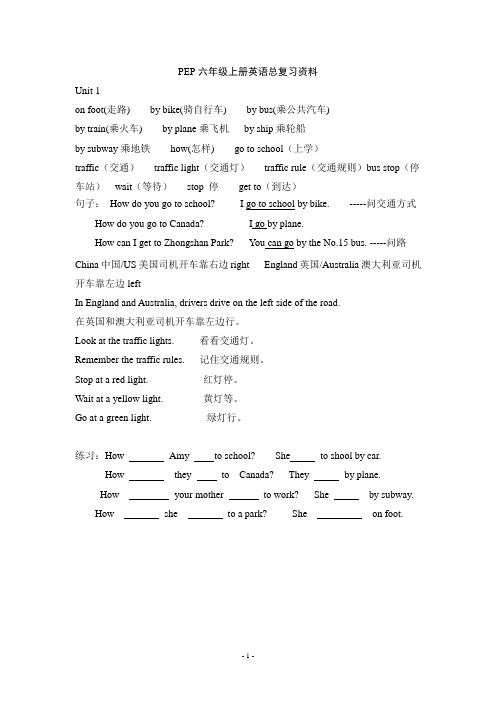
PEP六年级上册英语总复习资料Unit 1on foot(走路) by bike(骑自行车) by bus(乘公共汽车)by train(乘火车) by plane乘飞机by ship乘轮船by subway乘地铁how(怎样) go to school(上学)traffic(交通)traffic light(交通灯)traffic rule(交通规则)bus stop(停车站)wait(等待)stop 停get to(到达)句子:How do you go to school? I go to school by bike. -----问交通方式How do you go to Canada? I go by plane.How can I get to Zhongshan Park? You can go by the No.15 bus. -----问路China中国/US美国司机开车靠右边right England英国/Australia澳大利亚司机开车靠左边leftIn England and Australia, drivers drive on the left side of the road.在英国和澳大利亚司机开车靠左边行。
Look at the traffic lights. 看看交通灯。
Remember the traffic rules. 记住交通规则。
Stop at a red light. 红灯停。
Wait at a yellow light. 黄灯等。
Go at a green light. 绿灯行。
练习:How Amy to school? She to shool by car.How they to Canada? They by plane.How your mother to work? She by subway.How she to a park? She on foot.library(图书馆) post office(邮局) hospital(医院)cinema(电影院) bookstore(书店) science museum科学博物馆supermarket超级市场bank 银行excuse me 对不起where(在哪里,到哪里) please(请) next to(与…相邻) turn right (向右转) turn left(向左转) go straight(笔直走) north 北south 南east 东west 西then (然后)Where is the cinema, please? It’s next to the hospital. ---- 问地点Where is your home? My home is near the post office.Where are you going this afternoon? I am going to the bookstore.Where are you going? I am going to the sky.Turn left at the cinema, then go straight. It’s on the left.1.与银行相邻2.在学校附近3.在医院的右边4.在博物馆左转5.在邮局前面6.在电影院的南边today 今天tomorrow明天tonight今晚weekend 周末next week(下周) this morning(今天上午) this afternoon(今天下午)this evening (今天晚上) take a trip去旅行read a magazine读杂志go to the cinema 去电影院visit grandparents看望祖父母play sports 做运动read books读书clean my room 打扫房间theme park 主题公园the Great Wall 长城comic book(漫画书) post card(明信片) newspaper(报纸)magazine杂志dictionary字典buy(购买)What are you going to do this evening? ----- 问做什么I’m going to visit my grandparentsWhen are you going to the library? This afternoon.I am going to buy a pair of shoes in the shoestore.Where are you going this afternoon? I’m going to the bookstore.What are you going to buy? I am going to buy a comic book.一般将来时态(be going to/will + 动词原形)表示一般将来时的时间状语有:this morning, this afternoon, this evening, tomorrow, tonight, this weekend, on the weekend, next week, next month, next year, next weekend.(今晚)你将要做什么?What are you going to do (this evening)?I’m going to the cinema. I’m going to visit my grandparents.你将什么时候去?When are you going? I’m goin g at 7:10.你将怎样去呢?How are you going? I’m going by bus.今天下午你将要去哪里?Where are you going this afternoon? I’m going to the bookstore.你将要买什么呢?What are you going to buy? I’m going to buy a comic book.你将和谁一起去?Who are you going with? I’m going with my parents.1.I (go)a park tomorrow.2.She ( buy) a book.next week.3.We (visit)my grandparents this weekend.4.I ( go ) to KM this Sunday.How what when where填空1.A: are you going this afternoon?B:I’m going to the post office.2.A: are you going to buy?B:I’m going to buy a post card.3. A: are you going?B:I’m going at 4 o’clock.4.A:are you going there?B:I’m going by bus.hobby(爱好) ride --riding a bike(骑自行车)dive--diving(跳水) play —playing the violin(拉小提琴)make—making kites(制作风筝) collect—collecting stamps(集邮) live –lives(居住) teach--teaches(教) go--goes(去) watch--watches(看)read--reads(读,看)What is your hobby? I like collecting stamps. --------问喜好What does your mother do? She is a TV reporter. ------问职业Does she teach English? No, she doesn’t.Does she teach you math? Yes, she does.动名词:(3种变化规律)1. 直接加ing:do—doing draw—drawing cook—cooking answer—answeringread—reading listen—listening fly—flying sing—singing play—playing2. 去掉末尾的e加ing:write—writing dance—dancing take—taking have—havingmake—making ride—riding dive—diving3. 元音+辅音结尾,双写末尾字母加ing:get—getting run—runningswim—swimming sit—sitting put—putting 你正在干什么?What are you doing? I’m answering the phone.他/她/它正在干什么?What is he/she/it doing? He’s/She’s/It’s …他(她、它)们正在干什么?What are they doing? They are …看到like或likes后面的动词要加上ing第三人称单数:后面的动词要加s或es1. 一般情况加s,如:read—reads;live—lives;play—plays;sing—sings2. 动词末尾以s,x,ch,sh或部分以o结尾的加es。
PEP小学英语六年级上册总复习资料 第四单元
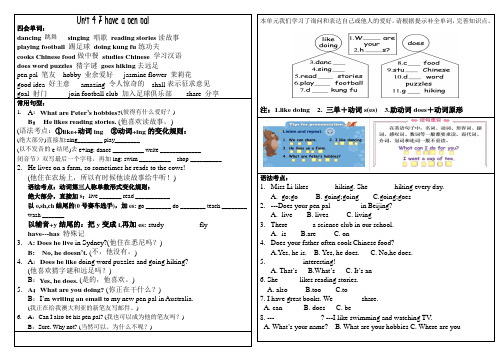
Unit 4 I have a pen pal四会单词:dancing跳舞singing 唱歌reading stories读故事playing football踢足球doing kung fu练功夫cooks Chinese food做中餐studies Chinese学习汉语does word puzzles猜字谜goes hiking去远足pen pal 笔友hobby 业余爱好jasmine flower 茉莉花good idea 好主意amazing 令人惊奇的shall表示征求意见goal 射门join football club 加入足球俱乐部share 分享常用句型:1.A:What are Peter’s hobbies?(彼得有什么爱好?)B:He likes reading stories. (他喜欢读故事。
)(语法考点:①like+动词ing ②动词+ing的变化规则:(绝大部分)直接加:sing________ play________(以不发音的e结尾)去e+ing: dance __________ write _____________闭音节)双写最后一个字母,再加ing: swim __________ shop __________2.He lives on a farm, so sometimes he reads to the cows!(他住在农场上,所以有时候他读故事给牛听!)语法考点:动词第三人称单数形式变化规则:绝大部分,直接加s:live _______ read ___________以o,sh,ch结尾的(0号赛车选手),加es: go ________ do ________ teach ________ wash _______以辅音+y结尾的:把y变成i,再加es: study _________ fly __________ have---has 特殊记3.A: Does he live in Sydney?(他住在悉尼吗?)B: No, he doesn’t. (不,他没有。
(完整word版)PEP小学英语六年级下册第一单元知识要点.doc

Unit 1 How tall are you?一、重点词汇形容词比较级变化规则1、一般词尾直接+ ertall (高的)— ____________(更高的)short (短的、矮的)— ____________(更短的、更矮的)long (长的)— ____________(更长的)young (年轻的)— ____________(更年轻的)old (年长的)— ____________(更年长的)smaller (小的)— ____________(更小的)strong (强壮的)— ____________(更强壮的)2、以字母 e 结尾,词尾 + rnice(好的)— ____________(更好的)late(晚的)— ____________(更晚的)3、辅 +元 +辅——双写最后一个字母+ erbig (大的)— ____________(更大的)thin (瘦的)— ____________(更瘦的)fat(肥胖的)— ____________(更肥胖的)4、辅 +y ——改 y 为 i + erheavy(重的)— ____________(更重的)happy(快乐的)— ____________(更快乐的)funny(滑稽的、有趣的)—____________(更滑稽的、有趣的)其他词汇:dinosaur ________ hall ________ metre(美) meter(英) ________than________ both________ kilogram________ countryside________ low-lower ________ shadow________ smart-smarter________ become____________二、重点句型1、年How old are you?I’m ⋯How old is he/she/XXx?2、身高How tall are you?I’m ⋯How tall is he/she/XXx?3、体重How heavy are you?I ’m How heavy is he/she/XXx? years old.He/ She/ XXx is ⋯ years old.metres.He/ She/ XXx is ⋯ metres.⋯ kilograms .He/ She/ XXx is ⋯kilograms .4、鞋What size are your shoes?My shoes are size⋯I wear(穿)size ⋯What size are his/ her shoes?His/ Her shoes are size⋯He/ She wears(穿)size ⋯5、两人或两个物品行比: A 比 B 更⋯⋯A + be ( am/is/are) + than + B例: I am ____________ _________ you.我比你更重。
新PEP小学英语六年级总复习资料

新PEP小学英语六年级总复习资料小学英语教材所选内容均来源于学生学习及日常生活,为学生所熟悉的。
因此,教师得抓住时机,充分运用教材,从起始年级,培养学生良好的说话的习惯。
小编在这里整理了英语相关知识,快乐看看吧!新PEP小学英语六年级总复习资料一. 反义词big(大的)--- small(小的) black(黑色)---white(白色) free(闲的)---busy(忙的)hot(热)---cold(冷) same(相同的)祝福您及家人身体健康、万事如意、阖家欢乐!祝福同学们快乐成长,能够取得好成绩,为祖国奉献力量!祝福您及家人身体健康、万事如意、阖家欢乐!祝福同学们快乐成长,能够取得好成绩,为祖国奉献力量!---different(不同的) cool(凉爽)---warm(暖和)tall(高的)---short(矮的) long(长的)---short(短的) young(年轻的)---old(老的)here(这里)---there(那里) before(之前)---after(之后) new(新的)---old(旧的)二. 单词归类1.国家(country)China中国 America美国 Australia澳大利亚 Japan日本England英国 Canada加拿大 France法国2.国籍(nationality)Chinese中国人American美国人Australian澳大利亚人Japanese日本人English英国人 Canadian加拿大 French 法国人3.语言(language)Chinese汉语 Japanese日语 English英语 French 法语4.科目(subject)Chinese语文 maths 数学 English 英语 art 美术music音乐 P.E. 体育 computer 电脑 science科学5.星期(week)Sunday星期日 Monday星期一 Tuesday星期二 Wednesday星期三Thursday星期四 Friday星期五 Saturday星期六6.季节(season) spring 春天 summer夏天 autumn秋天 winter 冬天7.月份(month)January一月 February 二 March三月 April四月 May五月 June 六月July 七月August 八月September 九月October 十月November十一月 December十二月8.节日(festival)Spring Festival 春节 Dragon Boat Festival龙舟节 Mid-autumn Festival中秋节New Year’s Day元旦National Day 国庆节Children’s Day儿童节Easter复活节 Halloween万圣节 Christmas 圣诞节Women‘s Day妇女节Teacher’s Day 教师节May Day劳动节9.患病(illness): have a fever发烧hurt疼痛have a cold感冒have a toothache牙疼have a headache头疼have a sore throat喉咙疼10.食物(foods)cake蛋糕 mooncake月饼 dumpling 饺子 bread 面包 pork猪肉fish鱼肉chicken 鸡肉meat肉beef 牛肉egg鸡蛋rice米饭soup汤 salad 沙拉 sandwich三文治 pizza 比萨饼 hamburger 汉堡包 noodles 面条11.时间(time)year年month 月week周date日期day 白天hour 小时morning早上afternoon下午evening晚上yesterday昨天today今天tomorrow明天 next week下个周 last weekend上个周末 last year 去年 the day before yesterday前天 two months ago12.服装(clothes)T-shirt T恤衫 sweater毛衣 coat 大衣 shorts短裤 jeans牛仔裤hat帽子cap帽子 shoe鞋子 sock 短袜 glove 手套scarf 围巾dress连衣裙skirt短裙shirt衬衫13.动物(animals)chicken鸡 duck鸭 goose鹅 dog狗 cat 猫 pig猪 sheep绵羊goat 山羊horse马lion狮子tiger老虎elephant 大象snake蛇kangaroo 袋鼠 monkey 猴子bear 熊 panda熊猫 whale鲸 hen母鸡 mouse老鼠 giraffe长颈鹿 deer鹿14.颜色(colour)grey 灰色 red红色 green绿色 yellow黄色 blue蓝色 white白色 black黑色pink粉红色 orange橙色 brown褐色 purple紫色15.饮料(drinks):juice汁 milk 牛奶 Coke可乐 tea茶 coffee 咖啡 water 水16.数字基数词:one 一 two 二 three三 four四 five五 six 六 seven七eight八 nine 九 ten十 eleven 十一 twelve 十二 thirteen 十三 fifteen 十五 twenty二十thirty 三十 forty 四十 fifty五十 hundred 百 thousand 千 million 百万序数词:first 第一 second第二 third第三 fifth第五 sixth第六seventh第七eighth第八ninth第九twelfth 第十二twentieth 第二十thirtieth第三十17.植物、水果蔬菜tree 树 flower花 grass草 fruit 水果 apple苹果 pear 梨 orange 橙 banana 香蕉 grape葡萄 peach桃子 strawberry草莓watermelon 西瓜pineapple菠萝vegetable蔬菜tomato西红柿potato马铃薯onion洋葱 cabbage卷心菜 green beans豆角18.职业(jobs)worker工人 farmer农民 doctor医生 nurse护士 teacher 教师driver司机 cook厨师 police officer警察 singer歌唱家cleaner清洁工postman邮递员fisherman 渔夫pilot飞行员coach教练businessman商人19、自然界sun太阳 moon月亮 star星星 sky天空 river江河 lake 湖 sea大海 hill山mountain山脉 snow雪 wind风 cloud云 rain雨20、天气(weather)sunny阳光明媚的windy有风的cloudy多云的snowy下雪的rainy下雨的 dry干燥的wet湿的 warm暖的 cool凉爽的 cold冷的 hot热的21、人体部分head头 hair头发 hand手 face脸 eye眼 ear耳朵 nose鼻子 leg 腿 foot脚22、人people人们 man男人 woman妇女 child小孩 grandparents祖父母 parents父母 father父亲 mother母亲 sister姐妹 brother兄弟cousin堂兄 uncle舅舅、叔叔 aunt阿姨23、文具pen钢笔 pencil铅笔 rubber橡皮 ruler尺 knife小刀 map地图dictionary字典24、建筑与房屋部分bedroom卧室living-room客厅kitchen厨房study书房washroom 卫生间 garden花园 office办公室 bank银行 school学校hospital医院cinema电影院park公园zoo动物园shop商店bookstore书店supermarket超市library图书馆museum博物馆post office邮局TV station电视台hotel宾馆wall墙floor 地板window 窗 door门25.日用品lamp台灯 light灯 telephone电话 clock钟 fridge冰箱 cup杯glass玻璃杯 box盒子 bowl碗26.方位词left左 right右 in front of 在前面 behind后面 near附近 next to与相邻27.家具bed床 desk书桌 table桌子 chair椅子 shelf 书架sofa沙发28.餐食meal一顿饭 breakfast早餐 lunch 午餐 dinner晚餐29.交通工具bus公共汽车 train火车 car小汽车 bike自行 ship轮船 boat小船 plane飞机 ferry轮渡 subway地铁 taxi出租车30.外貌tall高的 short矮的 fat胖的 thin 瘦的healthy健康的 nice好看的 beautiful(pretty)美丽的strong强壮的 old 老的 young 年轻的 heavy重的31.性格clever(smart)聪明的active活跃的quiet安静的shy 害羞的hard-working勤奋的strict严厉的kind和蔼的polile 有礼貌的helpful乐于助人的能干的四.动词词组go shopping去购物 go fishing去钓鱼 go boating去划船 go swimming 去游泳go skiing 去滑雪 go skating去溜冰 go for a walk 去散步 go hiking去远足 go on a picnic去野餐 go camping去野营 go to the cinema 去看电影 go to bed去睡觉 go to school去上学 go to work 去上班 go back回来 go out出去play football 踢足球play basketball打篮球play table tennis(play ping-pong)打乒乓球play badminton 打羽毛球 play the piano 弹钢琴 play games 玩游戏 write a letter写信listen to music听音乐 watch TV 看电视 see a film 看电影 take photos(pictures)照相clean the room打扫房间 wash clothes洗衣服 draw a picture 画画 have breakfast 吃早餐 have lunch 吃午餐 have dinner 吃晚饭do housework 做家务do my homework做作业have a Chinese lesson 上语文课take a dancing class上舞蹈课do morning exercises晨练pick apples 摘苹果plant trees种树wait for等候make cakes 做蛋糕 make the bed 铺床make a card 做卡片look for 寻找 put on穿上 wake up醒来 get up 起床五. 介词短语a pair of 一双 a lot of 许多 on the farm在农场 in front of在…前面 in the sky 在空中 on foot步行 in the morning 在早上in the afternoon在下午 in the evening在晚上 at night在晚上 at school 在学校 at home在家六、易错词汇1. a, an的选择: 元音字母开头的单词用an,辅音字母开头的单词用a.2. am , is , are的选择: I 用 am , you 用 are. 第三人称单数用is , 复数都用are.3. have , has 的选择: 表示某人有某物。
PEP小学六年级英语总复习

一、日常招呼用语:Hello! I’m Kate. 你好!我是Kate.What’s your name?你叫什么名字?My name’s Kate.我叫Kate。
See you tomorrow. Bye bye. Goodbye.再见Good morning. 上午好Good afternoon.下午好Good evening.晚上好Nice to meet you!见到你很高兴(第一次见面)Nice to meet you,too!见到你我也很高兴。
How are you?你好吗?Fine, thank you.我很好,谢谢。
(You’re welcome.不用谢)打电话:Can I speak to Amy?我能和Amy说话吗?This is Amy speaking. 我就是AmyWho’s that?你是谁?二、介绍人或物This is Kate 这是KateIs this Kate?这是Kate 吗?Yes,she is./No, she isn’t.Who’s that man?那个人是谁?He is my father.他是我爸。
What’s your mother?你妈是干什么的?(What does your mother do?)She is a worker.她是个工人。
Where are you from?你来自哪里?I’m from China.我来自中国。
What’s this?这是什么?This is my bedroom?这是我的卧室Is this your bedroom?这是你的卧室吗?Yes, it is ./ No, it isn’t.What’s that?那是什么?That is the room.那是电视房。
Is that the TV room? 那是电视房吗?Yes, it is /No, it isn’t.What are they?他们是什么?What are these?这些是什么?What are those?那些是什么?They are horses.他们是马。
(完整版)人教版(PEP)小学英语六年级上册复习资料
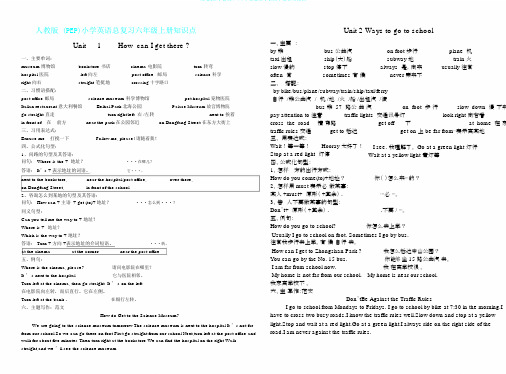
人教版 (PEP)小学英语总复习六年级上册知识点Unit1How can I get there ?一、主要单词:museum 博物馆bookstore 书店cinema 电影院turn 转弯hospital 医院left 向左post office邮局science 科学right 向右straight 笔挺地crossing 十字路口二、习惯语搭配:post office 邮局science museum 科学博物馆pet hospital 宠物医院Italian restaurant 意大利餐馆Beihai Park 北海公园Palace Museum 故宫博物院go straight 直走turn right/left 右 /左转next to 挨着in front of... 在 ...前方near the park 在公园邻近on Dongfang Street 在东方大街上三、习用表达式:Unit 2 Ways to go to school一、主要:by 乘bus 公共汽on foot 步行plane 机taxi 出租ship(大)船subway 地train 火slow 慢的stop 停下always 是,向来usually 往常often 常sometimes 有候never 素来不二、搭配:by bike/bus/plane/subway/train/ship/taxi/ferry自行 /乘公共汽 / 机 /地 /火 /船 /出租汽 /渡bus 乘 57 路公共汽on foot 步行slow down 慢下来pay attention to 注意traffic lights 交通讯号灯look right 向右看cross the road横穿路get off下at home 在家traffic rules 交通get to 抵达get on 上be far from⋯表示离某地Excuse me打搅一下Follow me, please! 请随着我!四、公式化句型:1、问路的句型及其答语:问句: Where is the + 地址?···在哪儿?答语: It’s + 表示地址的词语。
PEP六年级上册英语重点词汇、句型、语法总复习资料

PEP六年级上册英语重点词汇、句型、语法总复习资料PEPт?Unit 1 by( ) foot( ) bike( ) bus( ) train( ) how( ) go to school锛?锛?traffic锛?锛?traffic light锛?锛?traffic rule锛?锛塻top锛?锛?wait锛?锛?get to锛?锛?by plane( ) by ship ( ) by subway( )Unit 2 library( ) post office( ) hospital( ) cinema( ) bookstore锛?锛塼urn( ) then( ) where( ) please( ) next to( ) turn right ( ) turn left( ) go straight( )north( ) south( )east( ) west( )Unit 3 next week( ) this morning( ) this afternoon( ) this evening ( ) comic book( ) post card( ) newspaper( ) buy( )Unit 4 hobby( ) ride a bike鈥時iding a bike( ) play the violin鈥昿laying the violin( ) dive鈥昫iving( ) make kites鈥昺aking kites( ) collect stamps鈥昪ollecting stamps ( ) live鈥昹ives( ) teach鈥晅eaches( ) go鈥昰oes( ) watch鈥晈atches( ) read鈥時eads( ) does( ) doesn鈥檛=does not ( )Unit 5 singer( ) writer( ) actor( ) actress( ) artist( ) TV reporter( ) engineer( ) accountant( ) salesperson( ) policeman( ) cleaner( ) where锛?锛?work锛?锛?Unit 6 cloud ( ) sun( ) stream( ) come from( ) seed( ) soil( ) sprout ( ) plant( ) should ( ) then( )a pair of锛?锛?always锛?锛塪ictionary锛?锛塵agazine锛?锛?tomorrow锛?锛塭xcuse me 锛?锛?fun锛?锛?go to the cinema锛?锛?look锛?锛?month锛?锛?read a magazine锛?锛?science museum锛?锛?shoe store锛?锛?show锛?锛?take锛?锛?take a trip锛?锛?tell锛?锛?tonight锛?锛?vapor锛?锛?want锛?锛墂ith锛?锛?know锛?锛?minute锛?锛?again ( ) 閲嶇偣鍙ュ瀷瑕佹眰浼氳儗锛?Unit 1 How do you go to school, Sarah? 钀ㄦ媺锛屼綘鎬庢牱鍘讳笂瀛︼紵Usually I go to school on foot.?Sometimes I go by bike.銆?How can I get to Zhongshan Park?You can go by the No.15 bus. 浣犲彲浠ヤ箻15?Unit 2 Where is the cinema, please? It鈥檚next to the hospital. 璇烽棶锛岀數褰遍櫌鍦ㄥ摢閲岋紵瀹冧笌鍖婚櫌鐩搁偦銆?Turn left at the cinema, then go straight. It鈥檚on the left. 鍦ㄧ數褰遍櫌澶勫悜宸﹁浆锛岀劧鍚庣洿琛屻€傚畠鍦ㄥ乏杈广€?Unit 3 What are you going to do on the weekend? 鍛ㄦ湯浣犳墦绠楀共浠€涔堬紵I鈥檓going to visit my grandparents this weekend. 杩欎釜鍛ㄦ湯鎴戞墦绠?Where are you going this afternoon? I鈥檓going to the bookstore.€?What are you going to buy? 浣犳墦绠椾拱浠€涔堬紵I am going to buy a comic book. ?Unit 4 What鈥檚your hobby?I like collecting stamps. ?He likes collecting stamps, too. ?Does she teach English? No, she doesn鈥檛. ?Does she teach you math? Yes, she does. 濂规暀浣犳暟瀛﹀悧锛??Unit 5 What does your mother do? ?She is a TV reporter. 濂规槸涓€浣嶇數瑙嗗伐浣滆€呫€?Where does she work? 濂瑰湪鍝?She works in a school. 濂瑰湪涓€鎵€瀛︽牎涓婄彮銆?How does she go to work? She goes to work by bus.氦杞﹀幓涓婄彮銆?Unit 6 Where does the rain come from? It comes from the clouds. ?How do you do that? 浣犳What should you do then锛?鎺ヤ笅鏉ワ紝浣犲簲璇ュ仛浠€涔堝憿锛?PEPт笂鍐屼笁浼氬彞鍨?1. My home is near. 鎴戠殑瀹跺緢杩戙€?2. What about you? 浣犲憿锛?3. Look at the traffic lights . 鐪嬩氦閫氱伅銆?4. Remember the traffic rules. ?5. Stop at a red light. 绾㈢伅鍋溿€?6. Wait at a yellow light. 榛勭伅绛夈€?7. Go at a green light. 缁跨伅琛屻€?8. Can I go on foot? Sure, if you like. It鈥檚not far. 鎴戣兘姝?9. Where is the 鈥?It鈥檚near the 鈥?鍦ㄥ摢閲岋紵瀹冮潬杩?10. Excuse me, is there a 鈥?near here? Yes, there is. 鎵撴壈涓€涓嬶紝鍦ㄨ繖闄勮繎鏈夋病鏈変竴瀹垛€︼紵鏄?11. Is it far from here? No, it鈥檚not far. ?涓嶏紝瀹冧笉杩溿€?12. 锟紺Thank you. 锟紺You鈥檙e welcome. 璋㈣阿锛屼笉瀹㈡皵銆?13. Where is the 鈥? 鈥?鍦ㄥ摢閲岋紵It鈥檚east/west/south/north of the 鈥?瀹冨湪鈥︾殑涓滆竟锛岃タ杈癸紝鍗楄竟锛屽寳杈广€?14. When are you going? I am going at 3 o鈥檆lock. 浣犳墦绠椾粈涔堟椂鍊欏幓锛熸垜鎵撶畻3鐐归挓鍘汇€?15. Can he go with us? Sure. 浠栬兘鍜屾?16. Let鈥檚go together.鍚с€?17. There is a stamp show on Sunday.ㄥ睍銆?18. She is a teacher. She teaches math. 濂规槸涓€浣嶈€佸笀锛屽ス鏁欐暟瀛︺€?19. Does your pen pal live in Shanghai? 浣犵殑绗斿弸浣忓湪涓婃捣鍚楋紵No, he doesn鈥檛. He lives in Beijing. 涓嶏紝浠栦笉浣忎笂娴枫€備粬浣忓湪鍖椾含銆?20. Where does she work? She works in a car company.?21. How does she go to work? She goes to work by bus.?22. Where does the 鈥?come from? It comes from the 鈥?鈥?鏉ヨ嚜浜庡摢?23. How can the water become vapour?The sun shines and the water becomes vapour. 鍦ㄥお闃崇殑鐓у皠涓嬶紝姘村氨鍙樻垚浜嗚捀姹姐€?24. How do you do that? 浣犳€庢牱First, put the seeds in the soil. 棣栧厛锛屾妸绉嶅瓙鏀捐繘鍦熷¥閲屻€?25. It鈥檚easy. 瀹冨緢绠€鍗曘€?26. What should you do then??Water them. In several days, you can see a sprout.€?27. First, hen, ext, t last, 鈥?棣栧厛锛岀劧鍚庯紝鎺ヤ笅鏉ワ紝鏈€鍚庯紝涓€銆佺幇鍦ㄨ繘琛屾椂鎬侊紙3寰嬶級1. 鐩存帴鍔爄ng锛歞o鈥昫oing draw鈥昫rawing cook鈥昪ooking answer鈥昦nswering read鈥時eading listen鈥昹istening fly鈥昮lying sing鈥晄inging play鈥昿laying 2. ng锛歸rite鈥晈riting dance鈥昫ancing take鈥晅aking have鈥昲aving make鈥昺aking ride鈥時iding dive鈥昫iving 3. ng锛?get鈥昰etting run鈥?running swim鈥晄wimming sit鈥晄itting put鈥昿utting What are you doing? I鈥檓answering the phone. 浠?濂?What ishe/she/it doing? He鈥檚/She鈥檚/It鈥檚鈥?浠栵紙濂广€佸畠锛変滑姝e湪骞蹭粈涔堬紵What are they doing? They are 鈥?鐪嬪埌like鎴杔ikes鍚庨潰鐨勫姩ing ?(be going to/will + 鍔ㄨ瘝鍘熷舰)his morning, this afternoon, this evening, tomorrow, tonight, this weekend, on the weekend, next week, next month, next year, next weekend. 锛堜粖鏅氾級浣犲皢瑕佸仛浠€涔堬紵What are you going to do (this evening)? I鈥檓going to the cinema. I鈥檓going to visit my grandparents. 浣犲皢浠€涔堟椂鍊欏幓锛?When are you going? I鈥檓going at 7:10. 浣犲皢鎬庢牱鍘诲憿锛?How are you going? I鈥檓going by bus. 浠婂ぉhere are you going this afternoon? I鈥檓going to the bookstore. 浣犲皢瑕佷拱浠€涔堝憿锛?What are you going to buy? I鈥檓going to buy a comic book. 浣犲皢鍜岃皝涓€璧峰幓锛?Who are you going with? I 鈥檓going with my parents.e 銆丼he銆両t s 1.s ead鈥時eads锛沴ive鈥昹ives锛沺lay鈥昿lays 锛泂ing鈥晄ings 2. h锛宻h鎴栭儴鍒嗕互o缁撳熬鐨勫姞es watches, teaches, goes, does, washes, passes锛?3. 杈呴煶瀛楁瘝+y缁撳熬鐨勬妸y鍙榠鍐嶅姞es ly鈥昮lies锛泂tudy鈥晄tudies 4. 鐗规畩鎯呭喌锛歨ave--has 5. 绗О鍗曟暟鍖呮嫭锛歨e; she; it; my father/friend; Amy/Hangzhou绛変竴? e likes drawing pictures. She works in a car company. It comes from the clouds. My father goes to work on foot. Li Lei often plays computer games after lunch. 6.犱簡es锛屽悗闈㈠姩璇嶅氨涓嶅彉鍖栦簡銆??Does she teach English 锛?Does your pen pal live in Hangzhou? 鍥涖€佷笉瀹氬啝璇峚鍜宎n鐨勭敤娉?a 鐢ㄤ簬杈呴煶鍥犵礌寮€澶寸殑鍗曡瘝鍓嶏紱an鐢ㄤ簬鍏冮煶鍥犵礌寮€澶寸殑鍗曡瘝鍓嶃€傦紙a,e,i,o,u锛?an鐨勫崟璇嶏細an actor锛沘n actress锛沘n artist锛沘n engineer锛沘n accountant锛沘n English book锛沘n orange锛沘n apple锛沘n old woman 浜斻€佸姩璇嶅彉鍖栦负琛ㄧず鑱屼笟鎴栦汉鐨勫崟璇?1. 鍔ㄨ瘝鍚庨潰鍔爀r锛歸ork鈥晈orker 锛泃each鈥晅eacher锛泂ing鈥晄inger锛汿V report鈥昑V reporterclean鈥昪leaner 2. 鍔ㄨ瘝鍚庨潰鍔爋r锛歛ct鈥昦ctor锛沝octor 3.鐨勭洿鎺ュ姞r锛歸rite鈥晈riter锛沝ance鈥昫ancer锛沝rive鈥昫river 4. 鍔ㄨ瘝鍚庨潰鍔爄st锛歛rt鈥昦rtist锛泃our鈥晅ourist 5. 鑱屼笟鐢峰コ鏈夊尯oliceman鈥昿olicewoman锛涙紨鍛榓ctor鈥昦ctress€?which ?what 浠€涔?when 浠€涔堟椂鍊?where whose 璋佺殑why 涓轰粈涔?how 鎬庝箞鏍?who 璋?涓冦€佷汉绉颁唬璇嶅拰鐗╀富浠h瘝I鈥昺y(鎴戔€曟垜鐨? you鈥晊our(浣狅紱浣犱滑鈥曚綘鐨勶紱浣犱滑鐨? he鈥昲is(浠栤€曚粬鐨? she鈥昲er(濂光€曞ス鐨? we鈥昽ur() they鈥晅heir(浠栦滑/濂逛滑//濂逛滑鐨?瀹冧滑鐨? an鍚庨潰鍔犲姩璇嶅師褰?What can you do? I can cook the meals. He can fly kites. She can play the violin.。
pep小学英语六年级上册复习资料

pep小学英语六年级上册复习资料PEP小学英语六年级上册复习资料随着小学六年级上册英语学习的逐渐结束,孩子们即将迎来期末考试。
为了帮助孩子们更好地复习,本文将提供一些PEP小学英语六年级上册的复习资料,希望能对孩子们的学习有所帮助。
一、基础词汇复习在六年级上册的学习中,孩子们已经掌握了一定的英语词汇量。
在复习过程中,可以通过词汇卡片的方式进行记忆。
将单词写在卡片上,一面写英文,一面写中文,然后将卡片翻过来,通过读英文来回忆中文的意思。
可以通过这种方式来巩固词汇。
二、语法知识复习除了词汇外,语法知识也是英语学习中非常重要的一部分。
在复习过程中,可以通过做一些语法练习来加深对语法知识的理解。
例如,练习使用动词的不同时态,练习使用不同的句型结构等等。
通过这些练习,可以帮助孩子们更好地掌握语法知识。
三、听力训练在六年级上册的学习中,听力训练是非常重要的一环。
通过听力训练,可以提高孩子们的听力理解能力,帮助他们更好地理解英语的听力材料。
可以通过听录音并回答问题的方式来进行听力训练。
还可以通过听故事、听对话等方式来提高听力技巧。
四、口语练习口语练习是英语学习中非常关键的一环。
通过口语练习,可以提高孩子们的口语表达能力,培养他们的英语口语思维。
可以通过角色扮演、对话练习等方式来进行口语练习。
还可以通过与同学或老师进行英语对话来提高口语水平。
五、阅读理解阅读理解是英语学习中非常重要的一项技能。
通过阅读理解练习,可以帮助孩子们提高阅读理解能力,培养他们的阅读习惯。
可以通过阅读短文并回答问题的方式来进行阅读理解练习。
还可以通过阅读故事、文章等来提高阅读理解能力。
六、写作训练写作是英语学习中培养孩子们语言表达能力的重要环节。
通过写作训练,可以提高孩子们的写作能力,培养他们的写作思维。
可以通过写日记、写作文等方式来进行写作训练。
还可以通过与同学或老师进行英语写作交流来提高写作水平。
以上是对PEP小学英语六年级上册的复习资料的介绍。
新PEP六年级英语总复习及练习精选全文完整版

可编辑修改精选全文完整版六年级英语毕业总复习一单词名词动词形容词可数不可数原型进行式过去式第三人称单数原型比较级apple water do doing did does fat fatter(将来时、一般现在时)(一般现在时)单数复数apple apples一、定义:名词可以分为可数名词和不可数名词,不可数名词没有单复数,一律看作单数。
二、可数名词:分为单数和复数⑴单数:以元音音标a e i o u 开头的单数用an(一个),其他用a(一个)或者one +单数复数:some(一些)加复数或者不可数名词;或者大于1的具体数字+复数⑵可数名词单数→复数的变化规则:三、不可数名词:以下词为常为不可数名词,他们的复数形式就是他们本身。
water 水milk牛奶tea 茶rice米饭juice 果汁bread面包meat 肉四、人称代词:be 动词am , is , are的选择: 单数用is , 复数用are,I 用am , you 用are.练习题一、选择a或an或some.pen bag apple big applebananas orange books water二、写出下列各词的复数.watch _______ child _______ day________ foot________ book_______ sheep ______ box_______ peach______ man______fish _______ paper_______三、选择:1、There on the wall .They are very beautiful.A. are photoesB. are photos2、That’s book.A. anB. a3、There some in the river.A. are, fishesB. are ,fish4. Would you like _______ ,please?A. some watersB. some water5、Do you want to drink much ?A、a milkB、milk四、选择be(am is are ) 填空。
PEP小学六年级英语总复习资料.doc

PEP小学六年级英语总复习资料
小学英语总复习
一:学生易错词汇
1.a, an的选择:元音音素开头的单词用an,辅音音素开头的单词用 a.
2.am , is , are的选择:单数用is ,复数用are, I 用am , you 用are.
3.have , has的选择:表示某人有某物。
单数用has ,复数用have, I you 用have .
4.there is, there are的选择:表示某地有某物或某人。
单数用there is ,复数用there are.
5.some, any的选择:肯定句用some,疑问句和否定句用any.
6.疑问词的选择:what (什么)who (谁)where (哪里)whose (谁的)why (为什么)when(什么时候)which (哪一个)how old (多大)how many (多少)how much (多少钱)二:形容词比较级详解
当我们需要对事物作出比较时,需要用到比较级。
比较级的句子结构通常是:
什么+动词be (am , is , are ) +形容词比较级+ than (比)+什么,如:。
PEP小学英语六年级上册复习资料
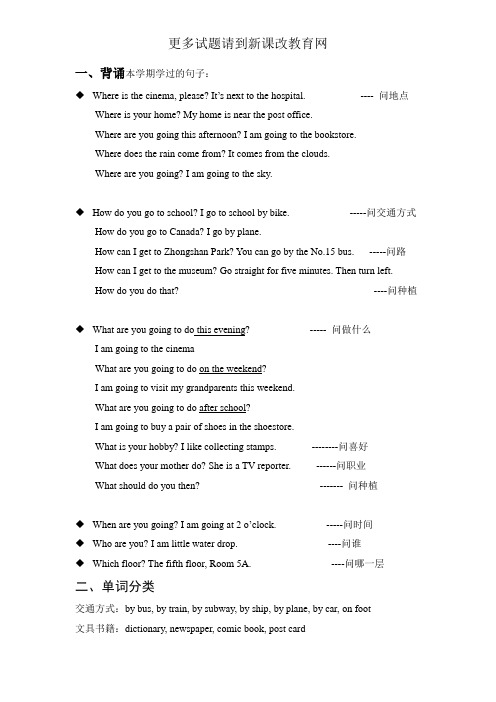
一、背诵本学期学过的句子:◆Where is the cinema, please? It’s next to the hospital. ---- 问地点Where is your home? My home is near the post office.Where are you going this afternoon? I am going to the bookstore.Where does the rain come from? It comes from the clouds.Where are you going? I am going to the sky.◆How do you go to school? I go to school by bike. -----问交通方式How do you go to Canada? I go by plane.How can I get to Zhongshan Park? You can go by the No.15 bus. -----问路How can I get to the museum? Go straight for five minutes. Then turn left.How do you do that? ----问种植◆What are you going to do this evening? ----- 问做什么I am going to the cinemaWhat are you going to do on the weekend?I am going to visit my grandparents this weekend.What are you going to do after school?I am going to buy a pair of shoes in the shoestore.What is your hobby? I like collecting stamps. --------问喜好What does your mother do? She is a TV reporter. ------问职业What should do you then? ------- 问种植◆When are you going? I am going at 2 o’clock. -----问时间◆Who are you? I am little water drop. ----问谁◆Which floor? The fifth floor, Room 5A. ----问哪一层二、单词分类交通方式:by bus, by train, by subway, by ship, by plane, by car, on foot文具书籍:dictionary, newspaper, comic book, post card职业:singer, writer, TV reporter, actor, actress, engineer, accountant, salesperson, policeman, policewoman,artist, cleanerV-ing形式:riding a bike, collecting stamps, diving, making kites, playing the violin 第三人称单数形式:lives,teaches, watches, goes, does, doesn’t公共场所:library,post office, cinema, hospital, science museum, bookstore方位:east, west, south, north, turn left, turn right, go straight交通灯; red light, yellow light, green light自然:sun, cloud, rain, vapour, stream种植:seed, soil, sprout, plant三、不定冠词a和an 的用法a 用于辅音因素开头的单词前,an用于元音因素开头的因素前如:a singer, a writer, a policeman ,a salesperson记住本学期出现过的用an 的单词:an actor , an actress, an English book, an artist, an accountant, an engineer, an orange, an old woman四、人称代词和物主代词I(我)—my(我的)you(你)—your(你们的)we(我们)—our(我们的)he(他)—his (他的)she(她)—her(她的)it(它)—its(它的)they(他们,她们,它们)—their(他们的,她们的,它们的)五、介词的用法ually I go to school on foot, sometimes I go by bike.2.Wait for the sprout. Wait for the flower to grow.3.See you at two o’clock.4.Go straight for five minutes. Then turn left.5.It on the left.6.Get on/ off at the post office.六、用动词的适当形式填空1.like或者likes后面直接跟动词的ing形式I like making kites.He likes collecting stamps.2.want to 跟动词原形I want to buy an English book in the bookstore.I want to be a science teacher one day.3.can后跟动词原形She can play the violin.I can play basketball.4.be going to 后跟动词原形(不要管是什么人称)What are you going to do on the weekend?I am going to visit my grandparents this weekend.John is going to buy a pair of shoes in the shoe store.。
新PEP小学英语六年级上册复习资料
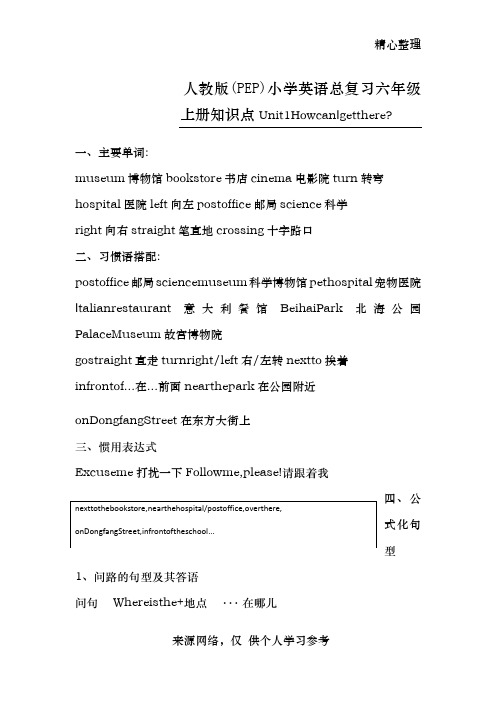
精心整理人教版(PEP)小学英语总复习六年级上册知识点Unit1Howcan I getthere? 一、主要单词:museum 博物馆bookstore 书店cinema 电影院turn 转弯:sciencemuseum talianrestaurantExcuseme 打扰一下 1Whereisthe+nexttothebookstore,nearthehospital/postoffice,overthere,I t’s+表示地点的词语。
它···。
2Howcan+主语+get(to)+the+Canyoutellmethewayto+Whereis+Whichisthewayto+Turn+方向+表示地点的介词短语。
atthecinemaatthecornernearthepostoffice...Whereisthecinema,please?I t’snexttothehospital.它与医院相邻。
Turnleftatthecinema,thengostraight.I t’sontheleft.在电影院向1、Whereisthemuseumshop?博物馆商店在哪里?I t’snearthedoor.他在门附近。
2、Whereisthepostoffice?邮局在哪里?I t’snexttothemuseum.它与博物馆相邻。
3、Whereistherestaurant?餐馆在哪里?I t’snexttothetheparkonDongfangStreet.它与东方街上的公园相邻。
Unit2Waystogotoschoolby乘bus公共汽车onfoot步行plane飞机taxi出租车ship subway地铁train火车slow慢的stop停下always usually通常often经常sometimes有时候never从来不,永不Wait Hooray I see.绿灯行Stopataredlight红灯停Waitatayellowlight1Howdoyoucome(to)+2、如何用must某人+must++.···必须···。
(word完整版)PEP小学英语六年级上册短语及词组复习资料
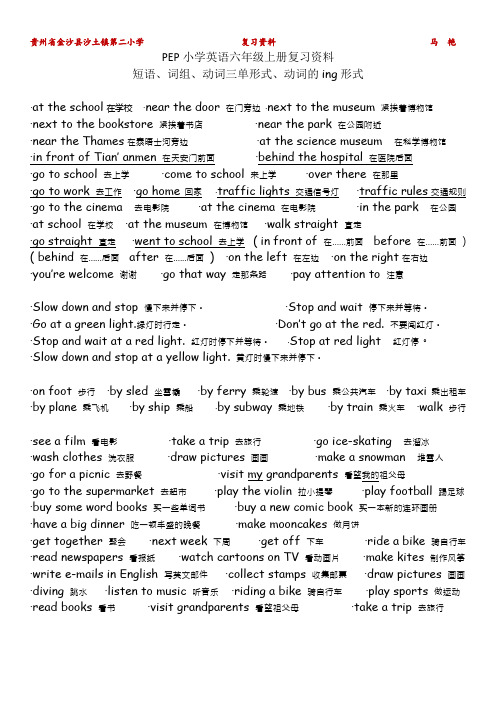
PEP小学英语六年级上册复习资料短语、词组、动词三单形式、动词的ing形式·at the school在学校·near the door 在门旁边·next to the museum 紧挨着博物馆·next to the bookstore 紧挨着书店·near the park 在公园附近·near the Thames在泰晤士河旁边·at the science museum 在科学博物馆·in front of Tian’ anmen 在天安门前面·behind the hospital 在医院后面·go to school 去上学·come to school 来上学·over there 在那里·go to work 去工作·go home回家·traffic lights 交通信号灯·traffic rules交通规则·go to the cinema 去电影院·at the cinema 在电影院·in the park 在公园·at school 在学校·at the museum 在博物馆·walk straight 直走·go straight 直走·went to school 去上学( in front of 在……前面before 在……前面) ( behind 在......后面after 在......后面) ·on the left 在左边·on the right在右边·you’re welcome 谢谢·go that way 走那条路·pay attention to 注意·Slow down and stop 慢下来并停下。
PEP六年级上册英语总复习资料
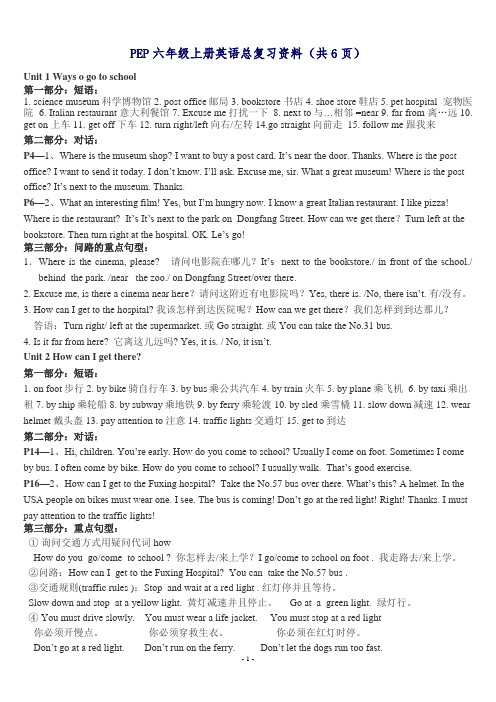
PEP六年级上册英语总复习资料(共6页)Unit 1 Ways o go to school第一部分:短语:1. science museum科学博物馆2. post office邮局 3. bookstore 书店4. shoe store鞋店5. pet hospital 宠物医院 6. Italian restaurant 意大利餐馆 7. Excuse me打扰一下 8. next to与...相邻 =near 9. far from 离 (10)get on 上车11. get off 下车12. turn right/left向右/左转14.go straight向前走 15. follow me 跟我来第二部分:对话:P4—1、Where is the museum shop? I want to buy a post card. It‟s near the door. Thanks. Where is the post office? I want to send it today. I don‟t know. I‟ll ask. Excuse me, sir. What a great museum! Where is the post office? It‟s next to the museum. Thanks.P6—2、Wh at an interesting film! Yes, but I‟m hungry now. I know a great Italian restaurant. I like pizza! Where is the restaurant? It‟s It‟s next to the park on Dongfang Street. How can we get there?Turn left at the bookstore. Then turn right at the hospital. OK. Le‟s go!第三部分:问路的重点句型:1.Where is the cinema, please? 请问电影院在哪儿?It‟s next to the bookstore./ in front of the school./ behind the park. /near the zoo./ on Dongfang Street/over there.2. Excuse me, is there a cinema near here?请问这附近有电影院吗?Yes, there is. /No, there isn‟t.有/没有。
六年级英语下学期(PEP人教版)全册单元知识点复习资料
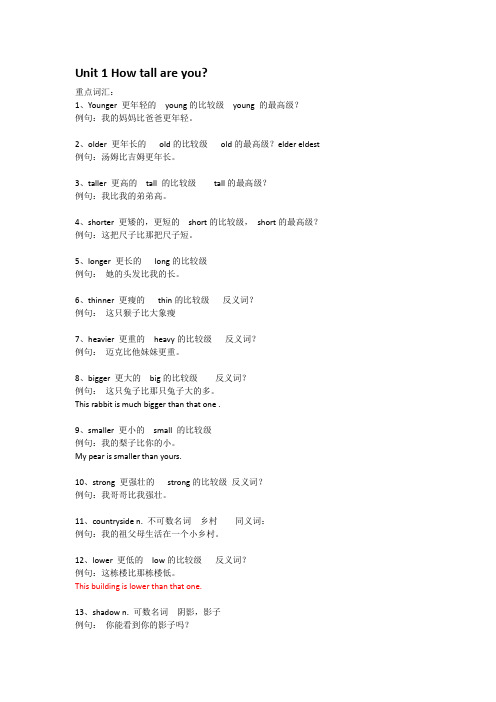
Unit 1 How tall are you?重点词汇:1、Younger 更年轻的young的比较级young 的最高级?例句:我的妈妈比爸爸更年轻。
2、older 更年长的old的比较级old的最高级?elder eldest 例句:汤姆比吉姆更年长。
3、taller 更高的tall 的比较级tall的最高级?例句:我比我的弟弟高。
4、shorter 更矮的,更短的short的比较级,short的最高级?例句:这把尺子比那把尺子短。
5、longer 更长的long的比较级例句:她的头发比我的长。
6、thinner 更瘦的thin的比较级反义词?例句:这只猴子比大象瘦7、heavier 更重的heavy的比较级反义词?例句:迈克比他妹妹更重。
8、bigger 更大的big的比较级反义词?例句:这只兔子比那只兔子大的多。
This rabbit is much bigger than that one .9、smaller 更小的small 的比较级例句:我的梨子比你的小。
My pear is smaller than yours.10、strong 更强壮的strong的比较级反义词?例句:我哥哥比我强壮。
11、countryside n. 不可数名词乡村同义词:例句:我的祖父母生活在一个小乡村。
12、lower 更低的low的比较级反义词?例句:这栋楼比那栋楼低。
This building is lower than that one.13、shadow n. 可数名词阴影,影子例句:你能看到你的影子吗?14、smarter 更聪明的smart的比较级例句:你变得越来越聪明了。
You are getting smarter and smarter.15、become v. 开始变得,变成例句:这个女孩想成为一名演员。
This girl wants to become an actress.重点短语:How tall 多高how heavy 多重how old 多大what size 多大号In this hall 在这个厅里both of 两个都over there 在那边have a look 看一看Go down 下降重点句型:①形容词的最高级:最高级通常用于3人或者3人以上的人或事物之间的比较。
- 1、下载文档前请自行甄别文档内容的完整性,平台不提供额外的编辑、内容补充、找答案等附加服务。
- 2、"仅部分预览"的文档,不可在线预览部分如存在完整性等问题,可反馈申请退款(可完整预览的文档不适用该条件!)。
- 3、如文档侵犯您的权益,请联系客服反馈,我们会尽快为您处理(人工客服工作时间:9:00-18:30)。
PEP小学六年级英语总复习资料
小学英语总复习
一:学生易错词汇
1.a, an的选择:元音音素开头的单词用an,辅音音素开头的单词用a.
2.am , is , are的选择:单数用is ,复数用are, I 用am , you 用are.
3.have , has的选择:表示某人有某物。
单数用has ,复数用have, I you 用have .
4.there is, there are的选择:表示某地有某物或某人。
单数用there is ,复数用there are.
5.some, any的选择:肯定句用some,疑问句和否定句用any.
6.疑问词的选择:what (什么)who (谁)where (哪里)whose (谁的)why (为什么)when(什么时候)which (哪一个)how old (多大)how many (多少)how much (多少钱)二:形容词比较级详解
当我们需要对事物作出比较时,需要用到比较级。
比较级的句子结构通常是:
什么+动词be (am , is , are ) +形容词比较级+ than (比)+什么,如:
r m taller and heavier than you.(我比你更高和更重。
)
An elephant is bigger than a tiger.(一只大象比一只老虎更大。
)
形容词的比较级是在形容词的基础上变化而来的,它的变化规则是:
①一般的直接在词尾加er ,如tall - taller , strong - stronger,
②以e结尾的,直接加r ,如fine - finer ,
③以辅音字母加y结尾的,先改y为i再加er,如funny -funnier
④双写最后的字母再加er,如I big - bigger, thin - thinner ,hot 一hotter
☆注意☆比较的两者应该是互相对应的可比较的东西。
典型错误:My hair is longer than you.(我的头发比你更长。
)
比较的两者是我的头发、你(整个人),那么比较的对象就没有可比性。
应该改为:My hair is longer than yours・或My hair is longer than your hair.
比较级专项练习:
、从下面中选出合适的单词完成句子
heavy tall long big
(l)How is the Yellow River?
⑵How is Mi; Green? He,s 175cm.
⑶How are your feet? I wear size 18.
(4)How is the fish? It" s 2kg.
二、根据句意写出所缺的单词
(1)r m 12 years old. You" re 14. T m than you.
(2)A rabbit,s tail is than a monkey,s tail.
(3)An elephant is than a pig.
(4)A lake is than a sea.
(5)A basketball is than a football.(贵的) 三、根据中文完成
句子.
(1)我比我的弟弟大三岁・I,m than my brothe 匚
(2)这棵树要比那棵树高.This tree than that one・
(3)你比他矮四
厘米.You are than he.
⑷谁比你重?than you?
四、根据答句写出问句
(1)r m 160 c m.
(2)I" m 12 years old.
Amy' s hair is 30 cm long.
三:动词过去式详解动词的过去式的构成规则有:
A、规则动词
①一般直接在动词的后面加ed:如worked , learned,cleaned,visited
②以e结尾的动词直接加d:如I lived , danced , used
③以辅音字母加y结尾的动词要改y为i再加ed (此类
动词较少)如I study 一studied carry 一carried worry 一worried (注意play>stay不是辅音字母加y,所以不属于此类)
④双写最后一个字母(此类动词较少)如stopped
B.不规则动词(此类词并无规则,须熟记)小学阶段要记住以下动词的原形和过去式:sing - sang , eat - ate ,
see 一saw , have 一had , do 一did , go 一went, take 一took , buy 一bought, get 一got,read 一read ,fly 一flew , am/is 一was ,
are 一were , say 一said , leave 一left, swim 一swam , tell 一told , draw — drew , come - came , lose — lost , find — found , drink 一drank , hurt 一hurt, feel 一felt
四:动词现在分词详解动词的ing形式的构成规则:
①一般的直接在后面加上ing ,如doing , going , working , singing , eating
②以e结尾的动词,要先去e再加ing ,如having , writing
③双写最后一个字母的(此类动词极少)有:running , swimming , sitting , getting 五:人称和数
人称代词物主代词主
格宾格
第一
人称单数I (我英语英语资料。
